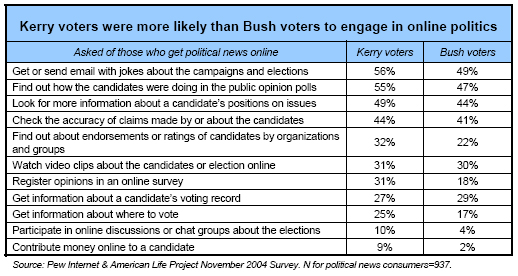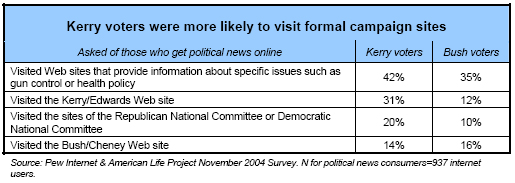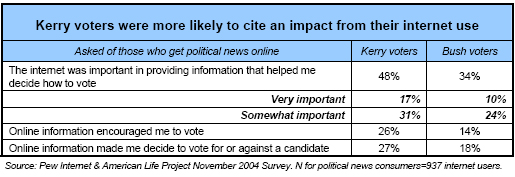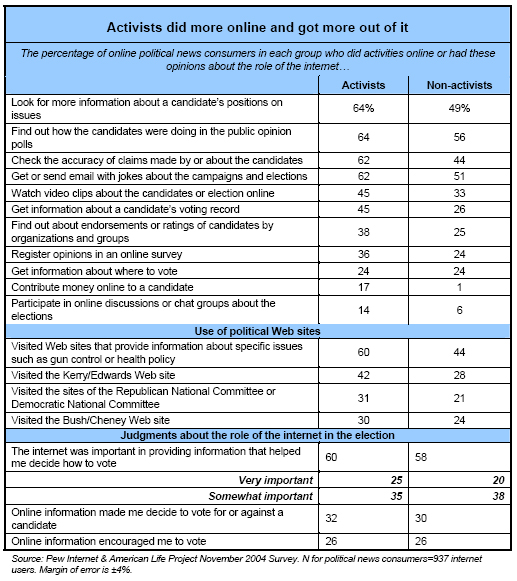The internet users who voted for Kerry were more engaged in online activities than Bush supporters.
It is important to start an analysis of the partisanship of the internet population by noting that George Bush won the votes of more internet users than John Kerry did. Bush got 54% of the votes of internet users, and Kerry got 46%.
However, in many noteworthy ways, Kerry supporters in the internet population were more active online than Bush supporters. At the most basic level, online Kerry supporters were slightly more likely than those backing Bush to use the internet to get political news and information: 59% of Kerry supporters did that, compared to 53% of Bush partisans. Online Kerry supporters were considerably more likely to use email to discuss campaign events with acquaintances, groups, or political organizations: 47% of wired Kerry supporters did that, compared to 36% of Bush supporters. And 17% of Kerry’s online supporters used the internet to participate directly in the campaign, compared to 10% of those supporting Bush.
The differences between the camps became even more evident when particular online campaign activities were probed, as the next table shows.

In addition to being the most active political emailers, Kerry voters were more likely than Bush voters to sign up for campaign email alerts: 12% online Kerry supporters signed up for such emails, compared with 4% of Bush voters who asked for Bush-campaign alerts.
Kerry voters outnumbered Bush voters in their use of candidate and political party sites, and they were more likely than Bush voters to use issue-oriented sites.
Just under a quarter of internet users (23%) visited at least one of the presidential candidates’ sites or the national party sites. Broken down by site, 18% of internet users visited the Kerry/Edwards site; 14% visited the Bush/Cheney site; and 14% visited the sites of either the Republican National Committee or its Democratic counterpart. When partisan preferences are taken into account, it was considerably more likely that Kerry supporters went to the Web sites of political institutions than Bush voters. Indeed, Kerry voters were almost as likely as Bush partisans to have visited the Bush Web site.

Kerry voters were more likely to get online information that helped them make up their mind how to vote. And they were more likely to say the internet was a helpful force in the campaign.
Online Kerry voters were more likely than Bush backers to cite benefits from the internet, perhaps because Bush voters were most likely to decide their votes early. Those who were undecided until later in the process were more likely to benefit from such information.

Campaign activists used the internet more frequently in campaign 2004 than the general internet population.
We asked survey respondents several questions about basic kinds of political activity in our survey and found that 26% of all Americans said they had participated directly in at least one campaign activity, including online activities such as donating to a candidate online. Using a more traditional definition of activism – those who did something offline to participate in a campaign – some 20% of Americans could be considered activists.
We defined campaign activist as someone who had either attended a campaign rally or donated to a political candidate or made telephone calls on behalf of a candidate or visited people’s homes to canvass for a candidate or used the internet to do campaign volunteer work. Some 20% of Americans said they had done at least one of those things.
Activists of all partisan stripes were more active online than non-activists. That’s not a tautology: the higher incidence of activists on most indicators of political internet use in our survey indicates a positive embrace of the medium for campaign learning and participation. If activists did not find the internet rewarding to use, they would have stayed with older media.
Since the emergence of the public internet a decade ago, political activists have harbored high hopes for the medium. It enables campaigners to communicate in real-time, with multiple constituencies, customizable messages, and the capacity to track responses, all at a comparatively low cost per contact and “acquisition” (i.e., a successful contact resulting in a campaign recruit, donation, or other desired response).
In 2004, presidential campaign activists found more people online available to their outreach than ever before, with the closeness of the 2000 election and the intensity of a wartime presidency providing extra motivation to them and their potential supporters.
So it is no surprise that campaign activists were more likely than non-activists to go online, get online news, create online content, create and read a blog, issue an online invitation, send and receive political email, subscribe to political e-newsletters, and visit Web sites maintained by candidates, issue groups, and political news and comment organizations.
They were also more likely to say that what they found on the internet helped them decide who to vote for (a mild surprise, since activists tend to have their minds made up well in advance), and encouraged them to vote.
Campaign activists were less likely to get most of their campaign news from television than was the general population. They were also less likely to cite convenience, and more likely to cite the desire for additional information, as their top reason for relying on the internet. Activists were less likely to get their online news from the major internet portals (AOL, Yahoo), and more likely to get it from major news organizations, political Web sites, and campaign Web sites.

Campaign activists voted for Kerry over Bush, 51%–39%. Non-activists preferred Bush, 49%–37%. The survey sample went for Bush, 44%–41%.




